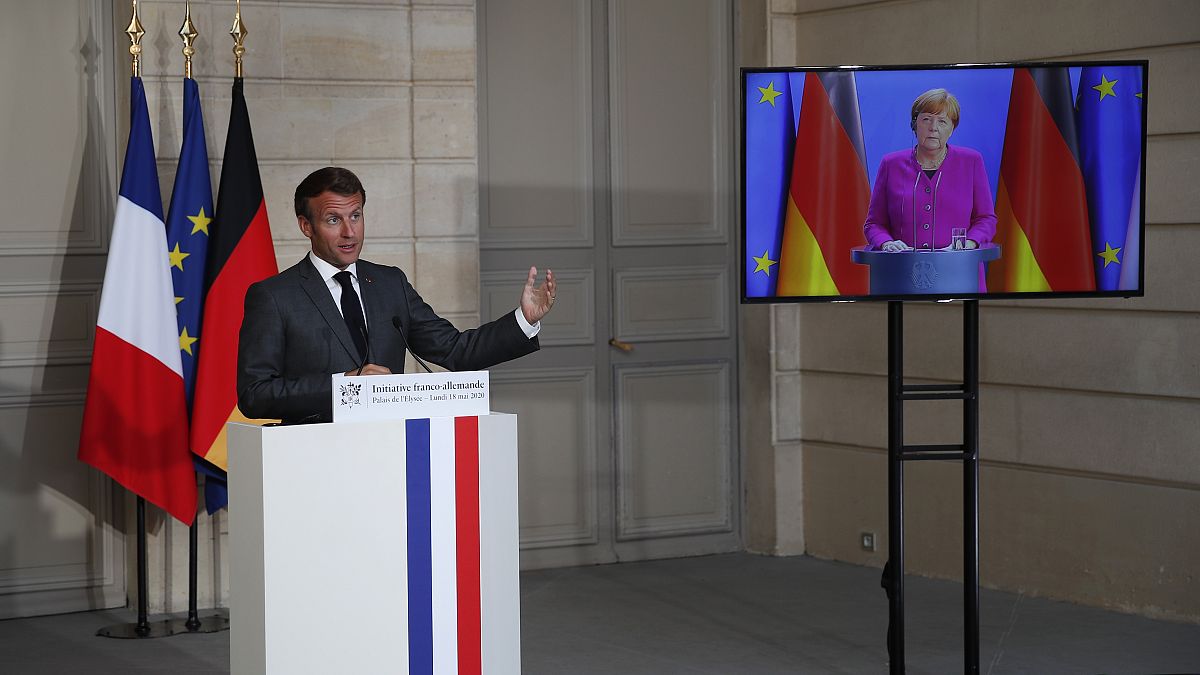Austrian Chancellor Sebastian Kurz has already indicated that his position and that of several member states collectively known as the Frugal Four "remains unchanged", signalling that the proposal will face strong resistance.
France and Germany have announced they are backing the creation of an EU bond to raise €500 billion to boost the European economy, severely weakened by the COVID-19 pandemic.
The two leaders, who unveiled their proposal in a joint video press conference, said that work is still needed "to bring together all the member states" as the measure is expected to raise objections in several member states, including the Netherlands and Denmark who have previously opposed the creation of so-called "coronabonds".
Austrian Chancellor Sebastian Kurz has already indicated that his position and that of several member states collectively known as the Frugal Four "remains unchanged", signalling that the proposal will face strong resistance.
The €500 billion recovery fund proposed would see the European Commission raise money on the markets in what Macron described as "a major step forward".
It would come on top of the bloc's next budget — the Multiannual Financial Framework — and the €540 billion of loans already announced by the Eurogroup.
The money raised by the Commission would be used "in a targeted manner" to support sectors and regions particularly impacted by the pandemic.
Macron and Merkel stressed that the 27 member states will have to agree to the proposal and that much remains to be worked out, including how the Commission's debt would be reimbursed.
"The current crisis cannot be compared to any crisis in the history of the European Union," they said in a statement.
"As our societies and economies slowly find their way out of the severe restrictions of recent times, we continue to face extraordinary uncertainties. Our goal, however, is clear: Europe will face this crisis together and we will emerge from it stronger," they added.
The Commission has welcomed the proposal with President Ursula von der Leyen saying that it "acknowledges the scope and the size of the economic challenge that Europe faces, and rightly puts the emphasis on the need to work on a solution with the European budget at its core."
"This goes in the direction of the proposal the Commission is working on which will also take into account the views of all Member States and the European Parliament," she added.
MEPs, however, demanded last week that the recovery package to tackle the COVID-19 economic fallout be worth €2 trillion.
What's in the Franco-German recovery plan?
The recovery plan championed by Paris and Berlin also aims to reinforce the EU's "strategic sovereignty in the health sector" through a boost in European research and development capacity in the field of vaccines and treatment methods, as well as the creation of common stocks of medicine and medical devices.
It also foresees the bloc coordinating procurement policies for future vaccines and treatments; the creation of an EU "Health Task Force" to develop national prevention and response plans against future epidemics; and the harmonisation in how health data is harvested and used.
France and Germany also want to accelerate the digitisation of the bloc and its environmental aspirations.
"Now is the time to drive the modernisation of European economies and their business models," they said.
"With this in mind, we reaffirm the European Green Deal as the new EU growth strategy and as a blueprint for a prosperous and resilient economy on the path to climate neutrality by 2050," they added.
'Our position remains unchanged'
Macron stressed that the upcoming task for the two leaders "will be to continue explaining" the proposal to the other member states in order to unite them behind it.
The issue of coronabonds has been hotly debated across the bloc with countries including Italy, Spain, and Portugal calling for solidarity between member states to be strengthened and debt to be pooled to tackle the economic impact of the pandemic.
But it has been rejected by other capitals including Vienna and Amsterdam.
Italian Prime Minister Guiseppe Conte described the Franco-German proposal on Twitter as "an important first step in the right direction along the lines intended by Italy".
Spain's Prime Minister Pedro Sanchez also wrote on social media: "We welcome the proposal by France and Germany to establish a €500 bn European Recovery Fund base don grants", adding that "now it's time for [the] EU to put forward a proper financial package."
But their Austrian counterpart Sebastian Kurz offered a glimpse of the tough negotiations to come, announcing on Twitter that he's spoken with the Danish, Dutch and Swedish leaders on the proposal and that their "position remains unchanged".
"We are ready to help most affected countries with loans," he said.
